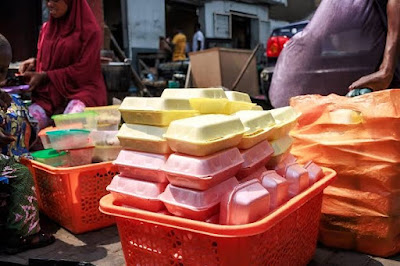My First Time On Sea
| While growing up I heard my mom repeatedly telling me how I saved a whole crew of Nigerian fishers who were sailing to Ekondo Titi - a popular fishing settlement in the neighbouring Cameroons. |
Both of my parents, with little me, were on that sea trip. Unluckily, the wooden boat they used took a wrong turn into an unapproved route manned by the Gendarmes - a fierce naval division of the Cameroon Armed Forces headquartered in Duala. More so, upon checking, it was found to carry some contraband goods. “It was double wahala”, she said. And these paramilitary men didn't seem to listen to the wailing and begging which by this had seized the air. The Atlantic coast on the Nigeria-Cameroon border was frequently heavily guarded by the Gendarmes who used speed boats to navigate through the rich mangroves. They were simply obeying the order from Yaounde over the Bakassi peninsula ownership dispute.
Everyone who was on the Nigerian boat was going to be transferred onto the speed boat steered by the Gendarmes. They were probably going to be taken to their detention camp located somewhere along the coast. It was a sad stormy night at sea for them.
Though I was about 4 years old then, my mom said I became the saviour to everyone. While other passengers were serially being ordered off the boat, my parents were reluctant to take turns while still begging. As God would have it, one of the men who seemed more violent slapped my dad, and lo, I threw up into ceaseless crying. It was unendingly serious that the gendarmes felt it and had to pardon the whole crew on my behalf.
I became the hero of the voyage that stormy night. But what did I know? This was little me then - in 1999 who merely cried because my dad was beaten.
The next time I would use sea again will be in 2023 at age 27, while on a site inspection journey to Calabar alongside a friend, and my elder brother who has never travelled by sea.
At first, when I told him we were likely going to use a speed boat at the Oron jetty to enable us to achieve our aim at Calabar and still return that same day, he gave a mixed response on the phone. He was as excited as he was afraid. But like my friend Inyang, I wasn't as afraid. I only believed we would land our destination safely - after all we all take risks every day of our lives and this was just one of such daily risks.
Though not completely thalassophobic, I can vividly recall dreading or panicking as a kid on my first experiment at swimming in a stream while on a holiday visit to my aunty - Atim who was based in Ukuku Udung near Eyofin, capital of Udung Uko LGA in Akwa Ibom, Nigeria. I like the sight of the beach and ocean but can get slightly afraid or anxious about walking into a large body of water. As indigenous people of Oron, people don't believe we can't swim but we often like keeping it on the low. It can seem abominable at times.
Thank God we landed safely at the Calabar Marina after 35 minutes. Using the 28.2km Uyo-Itu-Calabar land route which was in a dilapidated state would have taken us way longer - at least three hours in fact.
As soon as we arrived at the floating jetty, constructed in the year 1977 at Calabar South, we hung our tool bags and walked up the marina into the nearby streets. We eventually entered a waiting Toyota Corolla driven by one Bisum, who meandered us through Watt Market onto the Highway leading to the building site at Ikot Omin. We rounded up our concerns at the site at about 2 pm that afternoon and decided to drive straight to MUSTARD SEED - a well-known kitchen, where we ate a sumptuous late lunch - gari and soup, before coasting down the hilly and snake-like Crescent near the Marina resort to catch the four-o’clock ferry service operated by Sea Express back to the Oron mainland.
Travelling on the 30-seater spacious ferry boat was nothing short of an awesome cruise. All through the short trip, I would keenly watch the captain - a muscular man supposedly in his early fifties, turning the wheel along the sea route shown on the digital compass or map stationed right in front of him. The map showed our takeoff point up to the berth at Oron in real-time. There were thatched houses and huts found along the riverside nearer the Calabar jetty but we also saw at almost midway, a consistent stretch of mature mangroves by the right hand side of the river coast.
Each passenger paid N3,500 to be on the white coaster boat. It was an exciting moment for me, and I guess, for my brother too.


Comments